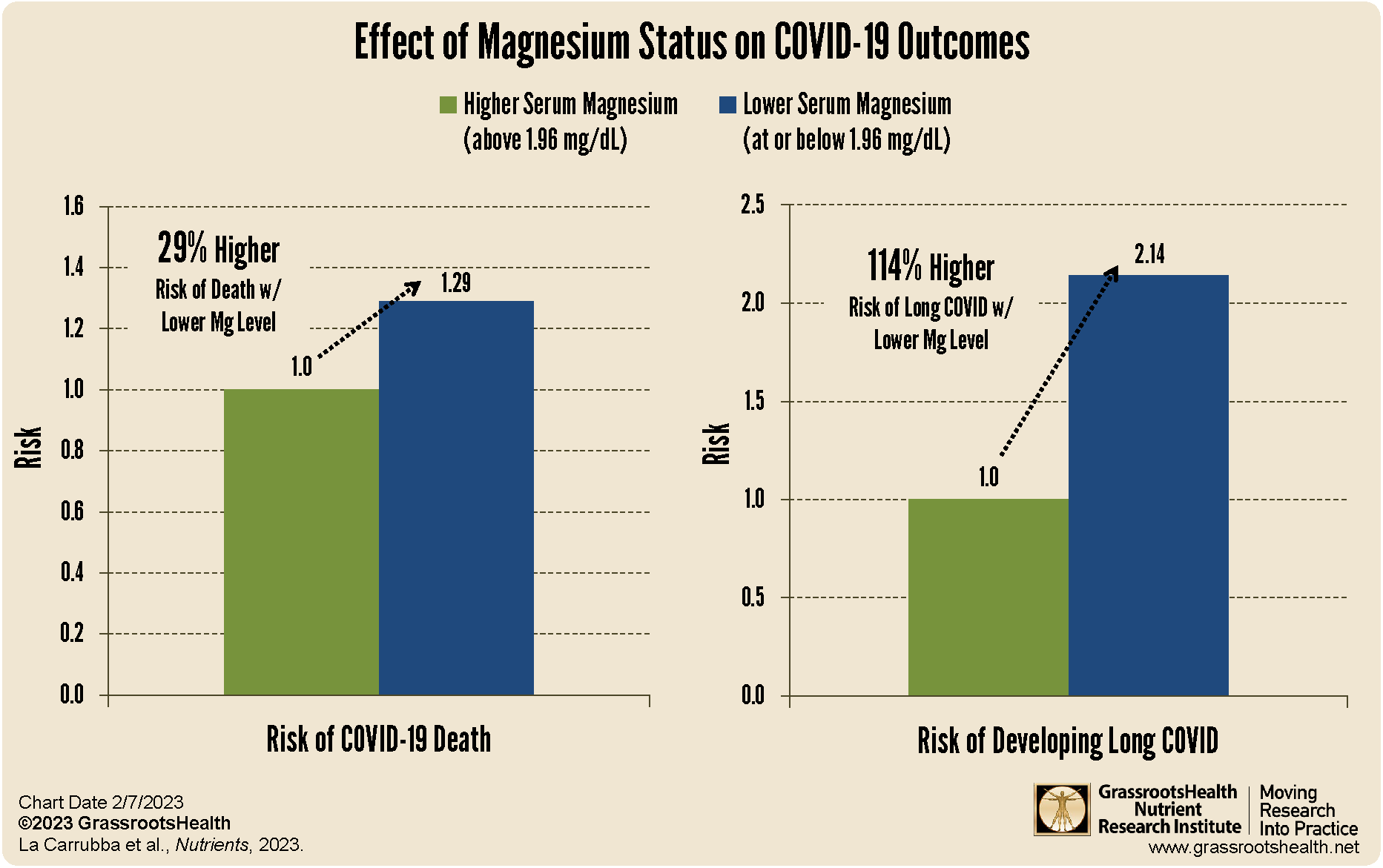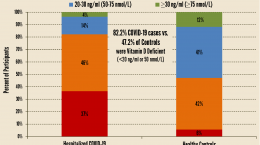Published on February 7, 2023
New study finds magnesium levels significantly predicted COVID-19 related death and the onset of Long COVID symptoms
Key Points
- Studies have demonstrated an association between low magnesium intake and levels and increased levels of inflammation and oxidative stress, as well as a higher incidence of diseases associated with chronic inflammation, such as diabetes, metabolic syndrome, cardiovascular disease, and now, COVID-19
- One study found that, compared to patients with higher magnesium levels, low serum magnesium levels were significantly associated with a 29% higher risk of in-hospital death and a 114% increased risk of developing long COVID
- All findings remained statistically significant after adjusting for other variables known to affect COVID-19 outcomes, indicating an independent role of magnesium in the pathogenesis of COVID-19 and long COVID

Increased COVID-19 disease severity has been linked to several independent risk factors, including vitamin D deficiency, obesity, high blood pressure, and diabetes. Magnesium may also help manage the effects of COVID-19 disease, both during and after infection, with observed associations between low magnesium intake and levels, and increased levels of inflammation and oxidative stress.
A recent study has now also demonstrated the predictive value of magnesium serum levels on outcomes of COVID-19 disease, including death and the onset of Long COVID.
Magnesium Levels at the Onset of COVID-19 Predicted Risk of Death and Long COVID Onset
A study by La Carrubba et al., using data from 260 adults (average age of 65 years), found that serum magnesium levels measured within the first four days of hospital admission accurately predicted in-hospital death, length of hospital stay, and the onset of Long COVID symptoms among COVID-19 patients. The study defined lower magnesium levels as at or below 1.96 mg/dL and higher levels as above 1.96 mg/dL.
Compared to patients with higher magnesium levels, low serum magnesium levels were significantly associated with a 29% higher risk of in-hospital death (HR=1.29) and a 114% increased risk of developing long COVID (OR=2.14). Patients with lower magnesium levels also had an average hospital stay of 15.2 days compared to 12.7 days for those with higher levels (p=0.048). All findings remained statistically significant after adjusting for other variables known to affect COVID-19 outcomes, indicating an independent role of magnesium in the pathogenesis of COVID-19 and long COVID.
How Can You Avoid Magnesium Deficiency
Increasing magnesium intake through the diet can help increase magnesium levels in the blood and eliminate the risk of diseases caused by magnesium deficiency. Magnesium supplements are effective at raising magnesium levels, as are foods that are high in magnesium, such as nuts and seeds (especially pumpkin, chia, sesame seeds, and brazil nuts), legumes (such as black beans and soy nuts), whole grain cereals, some leafy greens and vegetables, and dark chocolate.
Checking magnesium levels is one way to make sure you are getting enough magnesium. GrassrootsHealth offers an easy way to measure magnesium status at home using the whole blood magnesium test. This test measures the amount of magnesium in your blood cells as well as the plasma/serum, which is a better indicator of magnesium status than the serum magnesium test offered by most doctor’s offices and hospitals.
Magnesium Can Alter the Effects of Vitamin D on Disease Risk and Outcomes
Magnesium is an important co-nutrient for vitamin D, and is involved in the biosynthesis, transport, and activation of vitamin D. An existing magnesium deficiency may result in a vitamin D level that does not increase as much as expected in response to vitamin D supplementation. Magnesium and vitamin D work together synergistically to affect disease risk and outcomes as well, in such a way that the interaction of both is greater than the sum of their individual effects. Studies looking at the combined effect of vitamin D and magnesium have had outcomes such as improved ADHD symptoms, reduced severity of COVID-19, reduced risk of anemia, and improved cognition.
Make Sure You Are Getting Enough of Both Vitamin D, and Magnesium!
 Having and maintaining healthy vitamin D levels and other nutrient levels can help improve your health now and for your future. Choose which additional nutrients to measure, such as your omega-3s and essential minerals including magnesium and zinc, by creating your custom home test kit today. Take steps to improve the status of each of these measurements to benefit your overall health. With measurement you can then determine how much is needed and steps to achieve your goals. You can also track your own intakes, symptoms and results to see what works best for YOU.
Having and maintaining healthy vitamin D levels and other nutrient levels can help improve your health now and for your future. Choose which additional nutrients to measure, such as your omega-3s and essential minerals including magnesium and zinc, by creating your custom home test kit today. Take steps to improve the status of each of these measurements to benefit your overall health. With measurement you can then determine how much is needed and steps to achieve your goals. You can also track your own intakes, symptoms and results to see what works best for YOU.
Enroll in D*action and Test Your Levels Today!






